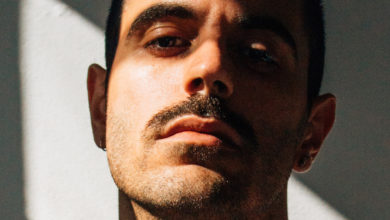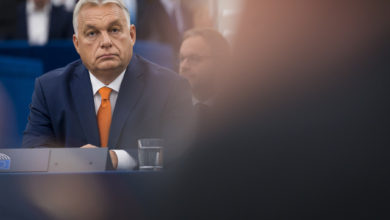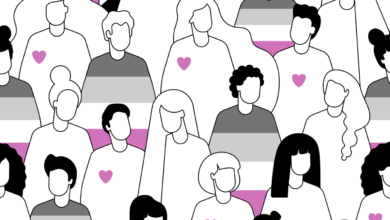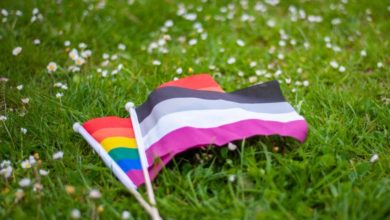„It is normal to be different” – Interview with Ulrike Lunacek, Former Vice President of the European Parliament
I have a very vivid memory from my first pride event. In July 2010 I participated in the Vienna Pride March and was following the truck of the Austrian Green Party (for pretty simple reason: their DJ played the coolest music). There was a dancing lady on the van of whom I couldn’t take my eyes off. She was truly happy and had such an energetic charisma that unwittingly attracted all the people around her. I didn’t know yet that that woman was Ulrike Lunacek.
Ms. Lunacek proved the world during her political career that with courage and sincerity everything is possible – even for an openly lesbian politician. Interview with the former vice-president of the European Parliament about past, present, political crusades and hopes and challenges of the European LGBTQ-community.

You started to fight for social justice and equal rights from a young age helping women’s refuge, empowering women and LGBTQ-people. What was your motivation to be an activist?
In 1978 I traveled through South America for 8 months, backpacking – and I got to know the huge differences between rich and poor in Peru and Bolivia, and I got to know what a military dictatorship means in Chile, where I got to know people whose friends or family members had been killed or survived torture during or after the coup, or had to go to exile – these experiences made me decide that I want to work in an area where I can make the world a better place.
On returning to my university town, Innsbruck, I became active in the solidarity movement with Latin America and in the growing feminist movement. On feminist issues I – like so many others – did not just want to discuss things but also contribute to changes, that’s why I became active in the task force which created the first shelter. Around that time (end of 1970’s, beginning of 1980’s) there also was a big women’s conference in Innsbruck which for the first time had a workshop on lesbians… It was a time of great changes, of lots of hope that things would get better soon, and that we would succeed in making the world a better place for women, for lesbians (we didn’t work together with gay men at that time), and for the ‚3rd world’, as the Global South was called at that time.

You served in the Austrian Parliament for 10 years (1999-2009), known as the first openly lesbian member of it. How difficult was it to have yourself accepted as queer woman with the members of the parliament (MPs) and the voters? What was the key to the success in your opinion?
It was not so difficult. Almost everyone in my own party appreciated having a woman expert on international and development issues and also open as a lesbian, who presented sexual orientation and the struggle for equal rights with the slogan ‚it’s normal to be different’.
And as I did not only work on LGBTI (Lesbian, Gay, Bisexual, Transgender and Intersexual) issues but also others like Foreign and Development Issues, me being lesbian was not always a topic. I rather had the impression that many fellow MPs only remembered me being a lesbian when that was the topic. Only few times did I personally hear words of discrimination (and I did not and do not want to know what was said when I was not around). A few times other fellow MPs, even from the conservative party, defended me. I think the key to success for me was that I did not hide being a lesbian, and that I presented it as a matter-of-fact, nothing rare or strange, just my way of life for which I demanded respect – and equal rights for all of us.
As Member of the European Parliament and later vice president of it you have done a lot for the LGBTI-community of the European Union and beyond that. What are your fondest memories and proudest achievements?
One is EuroGames in Budapest in 2012, which was so difficult to achieve for the organizers, under extremely restrictive political and financial circumstances – which I thanked the courageous organizers at my speech at the opening. And, an even fonder memory: I invited famous Hungarian classical music conductor Adam Fischer who I had become friends with during my time in the European Parliament to come to the swimming pool on the Sunday of the tournament (I take part in EuroGames swimming events myself). During the medal presentation he agreed to address the crowd: He welcomed everyone in his hometown and apologized that the Budapest authorities had not welcomed the LGBTI community as he think they should have. It was a very special and emotional speech, not only for me, but also for the crowd at the swimming pool on Margaret island – and he got wonderful applause!
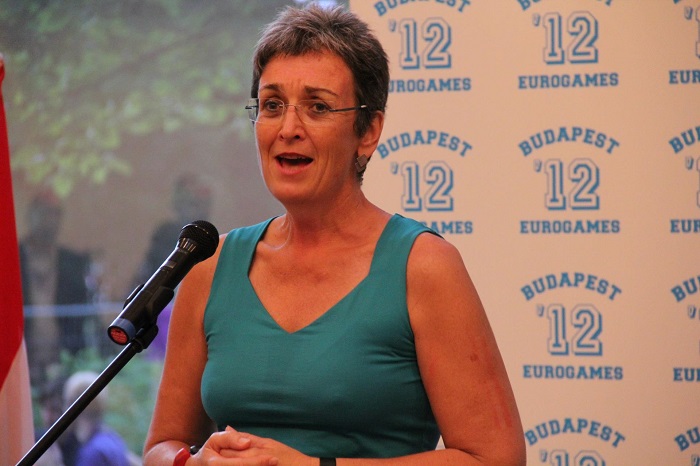

In October 2014 I managed (together with my assistant Hanna San Nicolo and many in the Parliament) to have Conchita Wurst – she had just won the Eurovision Song Contest – sing in Brussels on the Esplanade outside of the European Parliament, with a big crowd from inside and outside the Parliament attending and cheering her!
As for concrete parliamentary work my biggest success on LGBTI issues was the ‚Roadmap against homophobia and discrimination on grounds of sexual orientation and gender identity’ voted on Feb. 4, 2014, which demanded from the Commission to devise a strategy on the topic. A fervent campaign from right wing and evangelist Christian groups via social media against it hit not only me: received 40.000 protest emails in my mailbox the week before the vote, all other MEPs’ (Members of the European Parliament) mailboxes were filled with hundreds of protest mails, often with ridiculous content of the sort: ‚with that roadmap the universality of human rights will be gone because LGBTI people will have privileges over heterosexuals’, and my website was hacked.

After that I was very glad that I succeeded in getting it through the plenary with a good vote. Unfortunately the Commission only produced an ‚Action Plan’ for implementation – but this was also due to the fact of having more governments like the Hungarian in the EU who in the Council would go against a fully fledged strategy on LGBTI rights. (Just for information: The EU has strategies on different discriminated groups, be it women, people with disabilities or Roma, for example.)
very conservative but rather safe environment. And in my political work I always thought that – with this background and knowing LGBTI people from countries where persecution, prison, violence, even torture and assassinations were common – I wanted and had to support people in places where the situation still is not as open and safe as in Austria. In EU member states I often used the EU flag for my motto: Under this EU Flag we are protected, so get used to us being out and open and proud! We LGBTI people are simply citizens and human beings like anyone else, that’s why we demand equal rights. And again: It’s normal to be different!
I remember during my period in the European Parliament around 2011 and 2012 I was so grateful that you and your colleagues from the Intergroup on LGBTI rights participated in so many prides of Central and Eastern Europe. Why did you decide to do these missions – sometimes even put your life at risk due to the protesters?
That is easy to answer: I grew up and had my coming out in a very conservative but rather safe environment. And in my political work I always thought that – with this background and knowing LGBTI people from countries where persecution, prison, violence, even torture and assassinations were common – I wanted and had to support people in places where the situation still is not as open and safe as in Austria. In EU member states I often used the EU flag for my motto: Under this EU Flag we are protected, so get used to us being out and open and proud! We LGBTI people are simply citizens and human beings like anyone else, that’s why we demand equal rights. And again: It’s normal to be different!

How do you see the future of the LGBTI-community in Eastern Europe in the next 10 years?
I think in comparison to 10 or 20 or 30 years ago there is more positive awareness and acceptance and respect, and also more freedom for LGBTIQ people. But there is also a backlash already over the last years where nationalconservative and reactionary governments want to push us back into the closet, and live with discrimination and fear again. That’s why it is important to keep the EU and specifically the European Parliament as strong allies, and also to connect with allies of the LGBTIQ population among other groups. This is extremely important in order not to have those ‚illiberal democracies’ abolish not just anitdiscrimination laws but also an open way of life. It is necessary for us to resist and support each other! By the way, the next chance to do that at an election are the European Parliament elections in May 2019. The EP has a campaign called ‚This time I am voting’ in all 24 languages, please participate and go to vote at the end of May 2019!
People tend to say that Hungary is 30-40 years behind Austria both economically and socialwise. This statement may also be true with the acceptance of LGBTQ-community. What would you, who came out in the early eighties, message to those Hungarian teenagers who are in the closet and scared that their environment wouldn’t accept them?
Dare to be who you are and be open about it. Fear is the worst consultant for a human being’s life, that’s why I advise everyone not to let fear win over your life. It may be difficult for moments, but on the whole you will be a happier person because you do not have to hide that important part of your life, neither to your family nor to your friends, nor in school or at university, nor in your job or on the streets. And: take self-defence classes, it will make you more safe in the streets.
Next June Vienna is hosting the EuroPride in 2019 which has been the highlight of the year for the European LGBTQ-community for decades and alongside with Conchita Wurst you are the ambassador of the event. As it will be organized very close to Hungary I am sure that many of our readers would be interested in visiting it. Why is it important to have such an event and what makes next year’s one so special?
EuroPride 2019 Vienna will celebrate, among other things, 50 years of Stonewall which is usually seen as the beginning of the LGBTI movement. Celebrating what we have achieved all over the world, and empowering each other to continue our common struggle in more challanging times is central to EuroPride 2019 in Vienna. We also want to make an exhibition of LGBTI achievements in the Council of Europe member states to make our own history of those last 50 years more visible. With Andreas Brunner from QWien and EuroPride2019 Director Katharina Kacerovsky we will be present at this year’s ILGA Europe Conference in Brussels at the end of October in order to inform and invite people to take part in that exhibition. Look out for the ‚Consultation Space’ on EuroPride 2019 in case you will attend the ILGA Europe Conference!
The October issue is celebrating the 7th birthday of our magazine. What would you message to our readers and the Hungarian LGBTQ-community?
Keep on reading and supporting Humen, and be out and proud in your own life, this helps everybody to defend the open and liberal diverse society we all want to live in. And to LGBTI readers who Humen might have who are in favour of Prime Minister Orbán’s ‚illiberal democracy’ (because lesbians, gays, bisexuals, trans and intersex people are everywhere!): Just dare to be out and challenge restrictive view of society and family, you will feel freer as a consequence, I am sure!
Waliduda Dániel
Instagram: @waliduda


